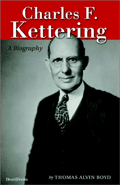|
|
|
|
||||||

|
Charles F. Kettering: A Biography
By Thomas Alvin Boyd 2002/05 - Beard Books 1587981335 - Paperback - Reprint - 254 pp. US$34.95 Charles F. Kettering is the embodiment of an American success story of an inventor and trailblazer. Publisher Comments
This is the engrossing story of a man whose life greatly advanced scientific research in the United States. In addition to being an inventor, engineer, and scientist, he was a farmer, schoolteacher, mechanic, social philosopher, and super salesman. Charles F. Kettering was a leading researcher for the automotive industry in the United States. Born in 1876, he saw the invention of the automobile in his early years. One of his major contributions was the battery-powered electric starter, which replaced cranking the automobile. In 1919, his Dayton Metal Products Co. was merged with General Motors and became the core of GM's research division. He is in the National Inventors Hall of Fame. From Turnarounds and Workouts Charles Kettering was born on a farm in northern Ohio in 1876. He once said, "I am enthusiastic about being an American because I came from the hills in Ohio. I was a hillbilly. I didn't know at that time that I was an underprivileged person because I had to drive the cows through the frosty grass and stand in a nice warm spot where a cow had lain to warm my (bare) feet. I thought that was wonderful. I walked three miles to the high school in a little village and I thought that was wonderful, too. I thought of all that as opportunity. I didn't know you had to have money. I didn't know you had to have all these luxuries that we want everybody to have today." Charles Kettering is the embodiment of the American success story. He was a farmer, schoolteacher, mechanic, engineer, scientist, inventor and social philosopher. He faced adversity in the form of poor eyesight that plagued him all his life. He was forced to drop out of college twice due to his vision before completing his electrical engineering degree. Kettering went on to become a leading researcher for the U.S. automotive industry. His company, Dayton Engineering Laboratories, Delco, was eventually sold to General Motors and became the foundation for the General Motors Research Corporation of which Kettering became vice president in 1920. He is best remembered for his invention of the all-electric starting, ignition and lighting system for automobiles, which replaced the crank. It first appeared as standard equipment on the 1912 Cadillac. Kettering held more than 300 patents ranging from a portable lighting system, Freon, and a World War I "aerial torpedo," to a device for the treatment of venereal disease and an incubator for premature infants. He conceived the ideas of Duco paint and ethyl gasoline, pursued the development of diesel engines and solar energy, and was a pioneer in the application of magnetism to medical diagnostic techniques. This book shows the wisdom and common sense of Kettering's approach to engineering and life. It received favorable reviews when was first published in 1957. The New York Times called it an "old-fashioned narrative biography, written in clean, straight-line prose-no nuances, no overtones, …but with enough of Kettering's philosophy and aphorisms, his tang and humor, to convey his personality." The New York Herald Tribune Book Review said, "(t)his lively book is particularly successful in its reflection of Kettering's restless, searching mind and tough persistence." Kettering once showed a passing tramp the "fun" of digging holes properly and gave him a job. The man, then promoted to foreman, later told Kettering, "(i)f only years ago someone had taught me how much fun it is to work, when a fellow tries to do good work, I would never have become the bum I was." Kettering once advised, "…whenever a new idea is laid on the table it is pushed at once into the wastebasket… (i)f your idea is right, get to that wastebasket before the janitor. Dig your idea out and lay it back on the table. Do that again and again and again. And after you have persisted for three or four years, people will say 'Why, it does begin to look as through there is something to that after all.'" Charles Kettering died on November 24, 1958. Thomas Alvin Boyd was a chemical engineer and a member of Charles Kettering's research staff for more than 30 years. Original Reviews: From New York Times, August 4, 1957 "It is old-fashioned narrative biography, written in the clean, straight-line prose - no nuances, no overtones, no tortures, but with enough of Kettering's philosophy and aphorisms, his tang and humor, to convey his personality. Charles F. Kettering is the simple success story of an optimistic and original mind" From New York Herald Tribune Book Review, May 5, 1957 "This lively book is particularly successful in its reflection of Kettering's restless, searching mind and tough persistence….Some of the special stories told here are fascinating." Thomas Alvin Boyd was born in 1888, and received a bachelor's degree in chemical engineering from Ohio State University in 1918. He later was awarded advanced degrees in both science and engineering from other institutions of higher learning. He was a member of Mr. Kettering's research staff for more than thirty years. He was also the recipient of the Lamme medal for meritorious achievement in engineering.
|
|
|
|
home
| about us
| contact us
| related
sites |